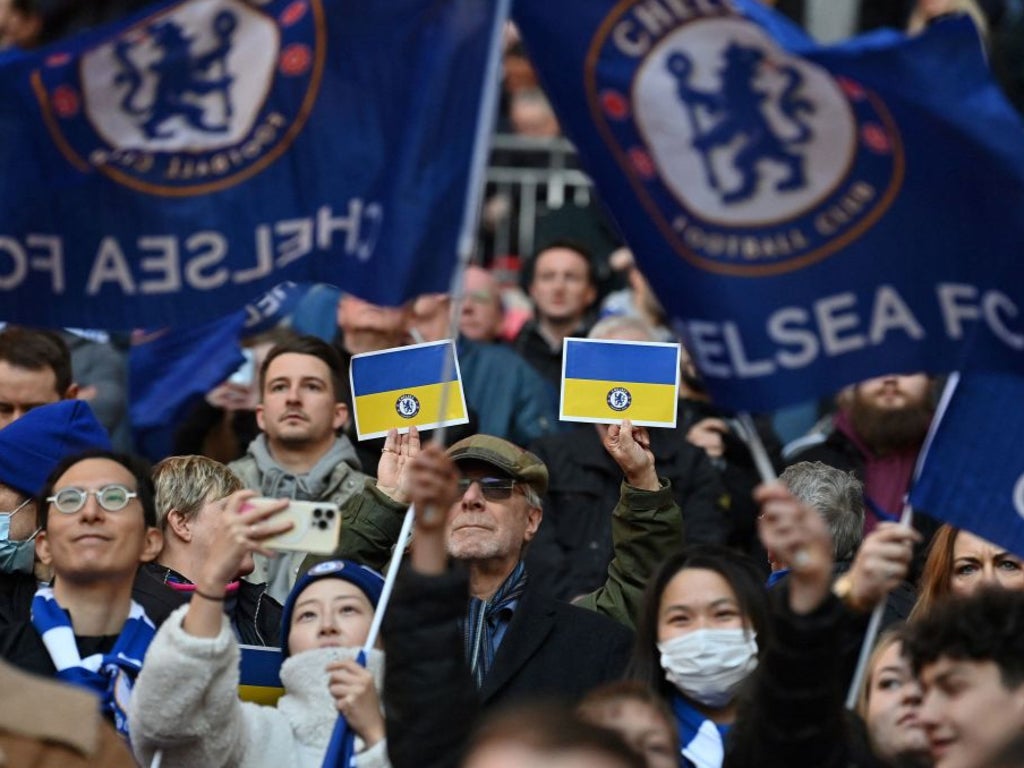
To truly capture the way Roman Abramovich’s wealth dazzled and beguiled, rather than becoming absorbed in the ugliness of its endgame, as fans interrupted a tribute to Ukraine to chant the name of a Russian oligarch, it’s best to return to where it all began in an attempt to make reason of the rancid. After all, it’s a sense of desperation that cultivates the illusions of a saviour, and Chelsea was the ailing but beloved institution in need of a financial lifeline. And so when Abramovich strode authoritatively and then absently through the halls of Stamford Bridge, even MPs weren’t unsusceptible to being wooed by the air of mystery. “At the end of the day, it required a fairy godmother to appear,” said David Mellor, who had chaired the government’s Football Task Force. “That fairy godmother appeared from Russia in the last three days.”
Then and now, it would require a test of anaemia to determine who out of politics and football has a paler moral compass. Certainly though, they are at their most insipid when combining forces. There were few dissenting voices in Parliament when Abramovich completed the £140m purchase of Chelsea in 2003, even if the means by which he’d amassed his billions had been well-publicised. Tony Banks, the late Labour MP and a passionate Chelsea fan, did urge an inquiry into the sale “to establish whether [Abramovich] is a fit and proper person to take over a football club in this country”, but his voice was drowned out by other supporters’ cheers.
The calls of concern last week, namely from Chris Bryant under Parliamentary privilege, pierce through the noise much more distinctly now. That it has taken the echoes of gunfire and human tragedy to bring them into the mainstream puts into perspective quite how obstinately football has ploughed on over the past two decades. History will look differently on an era that redefined English football but it is hardly a revelation, more so a reckoning with what’s always been in plain sight. Time has a way of making us numb to the inordinate, so much so that it can even normalise the presence of states and soft powers. Murky money and questionable motives now run so fiercely through the veins of the modern game that to try and cut them off would be akin to severing a vital artery.
And so, while Abramovich’s arrival changed everything, in the grander scheme of things, his hasty exit may change nothing at all. The pattern he set in motion, of eye-watering wealth, engorging competition, and different guises of ownership are more prevalent than ever. There are obvious examples, such as the persistent brazenness of Andrea Agnelli attempting to resurrect the European Super League; an idea so unpalatable even Boris Johnson was eventually forced to spit it out, like a golden retriever confronted by the one scrap of food even it couldn’t eat. There was Amanda Staveley, the face of Newcastle’s Saudi-backed ownership, who caveated her deepest sympathies for Abramovich with the unfortunate quote: “But we do have to hold all of our relationships to account.”
Perhaps, more than the 19 trophies, Staveley’s Freudian slip points to the bigger legacy Abramovich leaves behind. There is really nobody within football able to hold it to account anymore. The scale of its riches have left governing bodies backed into a corner and only an existential threat – not of war but government sanctions – has brought forwards any sort of lasting resistance. The idea of a Premier League intervention, such as the proposal to include a human rights aspect in its Owners’ and Directors’ Test, is laughable when considering who has already been deemed fit and it would still leave all manner of loopholes. Who is Richard Masters, at the end of the day, as canny and revenue-churning as he may be, to regulate and remonstrate with the superpowers and geopolitics that govern our world? The correct answer is not one that would bring any creases of surprise to his smile.
For Chelsea fans, yes, it is a prospect that genuinely shakes the fibres and will invite something close to a feeling of mourning for all those who live and breathe a club regardless of who is at its helm. Nobody can dispute the glory and glamour Abramovich brought to west London, even if it hardly redeems the taunts of those at Turf Moor on Saturday. But to those who pull at the strings of our game, from the Agnellis and Staveleys to the billionaires and consortiums lining up to buy Chelsea, it is an opportunity. One despicable land grab, with all its horrifying human consequences, has presented space for another kind altogether.
In 2013, Kevin Maguire, now an associate editor at the Daily Mirror, detailed a conversation he’d had with Tony Banks about a dinner the former sports minister allegedly had with Abramovich. Banks, who died in 2006, was asked if he had any worries about Abramovich’s ownership. “Because of the turbulent situation in Russia,” he reportedly answered, “I fear you could run out of money or be bumped off.”
Bumped out of football perhaps, but as Abramovich, according to Banks, said: “I won’t run out of money.” And the door he opened 19 years ago, which swung so quickly off its hinges, won’t blow shut with his departure either.







